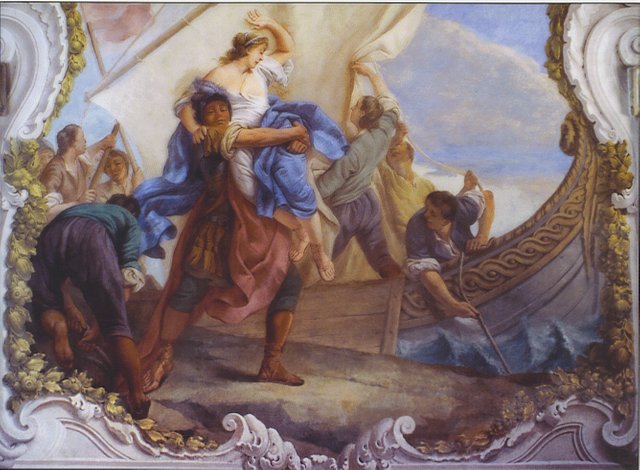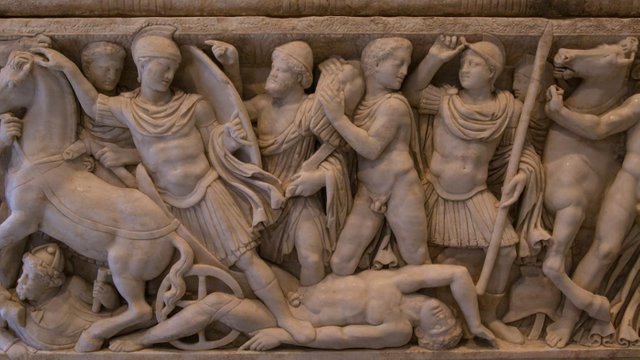One was the cunning Odysseus of Ithaca. He did not want to leave his young wife Penelope and his newly born son Telemachus. When Menelaus came to Ulysses with his familiar Palamedes, he went mad. To the ox he had stretched a donkey in front of the plow and sprinkled salt into the furrows instead of the seed. But Palamedes saw through the ruse of the Ithaker prince and stole secretly to his palace, took his son from the cradle and brought him to the field. Then he laid Telemachus in the furrow that Odysseus was about to scratch away. He stopped immediately because he did not want to pull the plow over his son. So he was convicted and could no longer refuse to participate in the campaign. He promised to provide twelve ships to the Menelaus.
The last prince who was missing was Achilles. At the age of nine he was prophesied by the seer Kalchas that the distant city of Troy could not be conquered without the boy. This prophecy also penetrated down to his mother Thetis in the deep sea. She knew that her son would die in Troy. To prevent this, she rose again from the sea and sneaked into her husband's palace. There she put her son in girl's clothes and brought him in that disguise to King Lycomedes on the island of Skyros, who let him grow up among his girls as a virgin. However, the seer Kalchas knew about his whereabouts and so Odysseus and Diomedes were sent to Skyros to fetch Achilles. When the king showed them his virgins, they did not recognize the future hero. Then Odysseus resorted to a ruse. He had spear and shield brought into the hall, where the women usually were. Apparently the war trumpet was blown. At this horror sound all the women fled the hall, only Achilles stayed behind and bravely took to arms. So exposed, he promised to join Patroclus, his friend, and fifty ships to join the Greek gentleman.
In the port city of Aulis in Boeotia the army and the fleet of the Greeks gathered. As supreme commander Agamemnon was appointed.
When the ships finally wanted to leave, there was no breeze and the fleet could not run. Then one questioned the seer Kalchas about the cause of this eerie calm. He answered that the goddess Artemis was angry with Agamemnon, who had killed one of her sacred deer cows while hunting. No wind would blow that long before Agamemnon sacrificed his eldest daughter, the beautiful Iphigeneia, to her.
Great was the pain of the father. But the army was in turmoil and so he declared himself ready for this sacrifice. Under the pretext that Achilles wanted to marry Iphigneia, he sent for his wife Klytemnästra and his daughter. Joyfully, they both hurried to Aulis with Orestes, the son of Agamemnon. But soon Klytemnästra learned of her husband's intention and before Iphigeneia she made the worst of her husband's allegations. But Iphegeneia agreed to go to sacrifice for Greece's sake. So the altar was prepared in the sacred grove of Artemis before Aulis and Kalchas stood ready with the sacrificial knife to perform the terrible ceremony. Artemis was reconciled by the obedience of Agamemnon and his suffering anguish and so she took the girl in a cloud and put a doe on the sacrificial altar.

